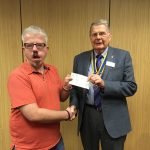Alex Barker who has Facial Palsy, explained to a meeting of the Rotary Club of Warwick last week about his experience of living with his disability, and the support he gives to others through the charity Facial Palsy UK.
We take for granted being able to communicate by meeting someone’s gaze, smiling, and responding to what they say to us. Alex has had facial palsy all his life, although for others it may happen overnight and they wake with half their face paralysed. The experience is life changing. They may have difficulties getting a job or finding the courage to go out in public because of people’s reactions to their appearance.
Alex’s facial palsy is due to a rare condition called Moebius syndrome. He has experienced people thinking he was drunk and refusing to serve him. Following an incident in Falmouth, he teamed up with “Changing Faces” and toured pubs throughout the south-west to raise awareness in the licensed trade of people with unusual appearance. Alex is now employed at IBM, Warwick, and has a fiancée, and plans for the future. He supports people coming to terms with their condition and gives talks to local groups to raise awareness.
Around 100,000 people in the UK live with Facial Palsy which takes a number of forms. Damage to the facial nerves can affect the ability to close the eye or blink, smile, eat or drink, or to speak clearly. It may be caused at birth, or by trauma to the head in an accident, through infection or by a stroke. The most well-known form is Bell’s Palsy, where one side of the face drops and makes eating and drinking difficult. It can have a devastating psychological impact as people may not want to go out into public due to their unusual appearance.
The charity Facial Palsy UK was only established in 2012 due to professional concern about the lack of knowledge and treatments for the condition. On average sufferers wait over 5 years from onset of paralysis to referral to a specialist, but should be helped within 72 hours if damage is to be limited. Health professionals were often poorly trained, and there were limited facilities in the community to support sufferers.
The charity is entirely funded through donations and works to improve assessment procedures, training, and research, and provides support to families and sufferers. Support is offered on a one to one basis and there are also some groups which meet, as well as a Facebook page offering on-line support. For further information and how to donate see www.facialpalsy.uk
Thanking Alex for his moving presentation Rotarian Laurie Day said Alex showed courage in coming to tell club about this little-known condition, and made us all more aware of how we respond to people who look different to us. In conclusion President John Taylor presented Alex Barker with a donation towards the work of Facial Palsy UK.
News
